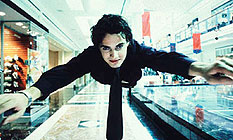|
|
|
|
Waydowntown
|
 |
|
It took two years to reach Australian screens, but the Canadian comedy Waydowntown is a droll delight. Its inspiration derives from a disquieting aspect of life in Calgary – the system of "Plus 15" walkways which ensure that citizens can travel from home to work and back without ever setting foot beyond an artificial, built environment. When the plot begins, all its workaday characters are starting to lose their minds. They are at day twenty-four of a Survivor-like game of endurance: who can stay indoors the longest? Most of the action takes place over an action-packed lunchtime. There are trysts in toilets, suicide attempts (for those who can work out how to break the glass), and the frantic scrambling of employees after a demented, old, kleptomaniac boss. Director Gary Burns (who previously made The Suburbanators [1995] and Kitchen Party [1997]) was painfully aware that his subject matter here would invite comparison with Kevin Smith's Clerks (1994), and that his busy style would remind some of Mike Figgis' execrable Time Code (2000). But Burns's brand of office comedy – one of cinema's great, underrated genres – is much closer to Luc Moullet's deadpan French farce The Comedy of Work (1987) and laconic, Australian films by Brian McKenzie (Stan and George's New Life, 1992) or Nigel Buesst (Compo, 1988). This is a digital movie that makes the most of the aesthetic limitations of a new technology. Its look is deliberately and unrelentingly ugly, especially when it comes to skin tones. Burns soups up the garish colours, flattens out the textures, and adds some well-chosen, cheesy special effects. The labyrinthine, physical world of tight corridors, glass chambers and mall escalators is rendered as claustrophobically as Jean-Luc Godard's sci-fi vision of Paris in Alphaville (1965). Much of the humour comes from razor-sharp editing and a subtle use of sound – such as those faint, distant screams we always seem to be hearing through the air-conditioning units. The acting (by an ensemble including Fabrizio Filippo and Marya Delver) is broad but in keeping with the overall tone. It is all too rare these days to find a comedy which stretches out the development of its gags across the entire duration of a story. Waydowntown keeps finding ways to top the topper, as gag writers of the Hollywood studio era used to say. One neurotic woman's desperate need to smell something fresh leads to hilarious complications and a wonderful pay-off. And just when you imagine Burns has exhausted all comic possibilities, there is an ending no viewer could predict. © Adrian Martin December 2002 |
![]()